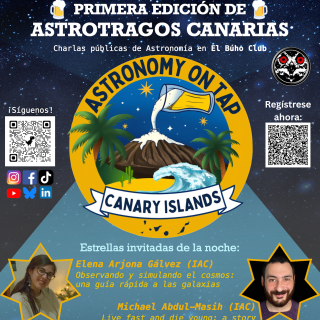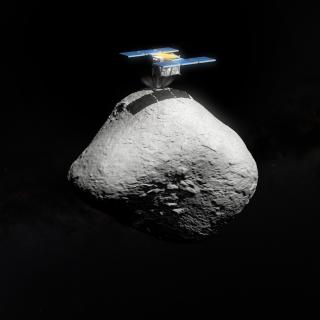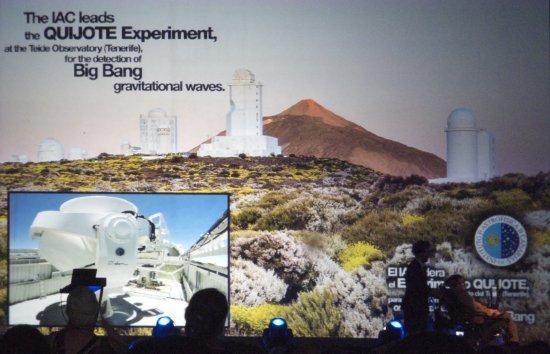It may interest you
-
 The Instituto de Astrofísica de Canarias (IAC) announces the arrival of the Astronomy on Tapinternational talk series in Spain, with its very first edition to be held in Tenerife. This outreach initiative, which was created in the United States and has since expanded worldwide, will now take place in the Canary Islands under the name "Astronomy on Tap – Canary Islands” and the local nickname “AstroTragos,” and is carried out within the framework of the EDUCADO and ExGal-Twin projects at IAC. The debut event will be held at the Búho Club (Calle Catedral, 3, La Laguna, Tenerife) on ThursdayAdvertised on
The Instituto de Astrofísica de Canarias (IAC) announces the arrival of the Astronomy on Tapinternational talk series in Spain, with its very first edition to be held in Tenerife. This outreach initiative, which was created in the United States and has since expanded worldwide, will now take place in the Canary Islands under the name "Astronomy on Tap – Canary Islands” and the local nickname “AstroTragos,” and is carried out within the framework of the EDUCADO and ExGal-Twin projects at IAC. The debut event will be held at the Búho Club (Calle Catedral, 3, La Laguna, Tenerife) on ThursdayAdvertised on -
 Astronomers have used telescopes around the world, includingthe Gran Telescopio Canarias (GTC or Grantecan) at the Roque de los Muchachos Observatory on La Palma, to study the asteroid 1998 KY26, revealing it to be almost three times smaller and spinning much faster than previously thought. The asteroid is the 2031 target for Japan’s Hayabusa2 extended mission. The new observations offer key information for the mission’s operations at the asteroid. “We found that the reality of the object is completely different from what it was previously described as,” says astronomer Toni Santana-Ros, aAdvertised on
Astronomers have used telescopes around the world, includingthe Gran Telescopio Canarias (GTC or Grantecan) at the Roque de los Muchachos Observatory on La Palma, to study the asteroid 1998 KY26, revealing it to be almost three times smaller and spinning much faster than previously thought. The asteroid is the 2031 target for Japan’s Hayabusa2 extended mission. The new observations offer key information for the mission’s operations at the asteroid. “We found that the reality of the object is completely different from what it was previously described as,” says astronomer Toni Santana-Ros, aAdvertised on -
 El Instituto de Astrofísica de Canarias organiza visitas guiadas y participa en la Feria de las Vocaciones Científicas de Canarias dentro de la Noche Europea de los Investigadores de la Macaronesia El Instituto de Astrofísica de Canarias (IAC) participará en MacaroNight 2025, la Noche Europea de los Investigadores e investigadoras de la Macaronesia, con dos actividades dirigidas a estudiantes de diferentes niveles educativos para acercar la astrofísica y fomentar las vocaciones científicas entre la juventud canaria. Visitas guiadas a la sede central del IAC Los días 22 y 23 de septiembre, elAdvertised on
El Instituto de Astrofísica de Canarias organiza visitas guiadas y participa en la Feria de las Vocaciones Científicas de Canarias dentro de la Noche Europea de los Investigadores de la Macaronesia El Instituto de Astrofísica de Canarias (IAC) participará en MacaroNight 2025, la Noche Europea de los Investigadores e investigadoras de la Macaronesia, con dos actividades dirigidas a estudiantes de diferentes niveles educativos para acercar la astrofísica y fomentar las vocaciones científicas entre la juventud canaria. Visitas guiadas a la sede central del IAC Los días 22 y 23 de septiembre, elAdvertised on
